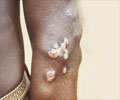Health experts are optimistic that ill health and death due to water borne diseases could soon be relegated to the past.
According to Alan Fenwick who had published his article in today's Science, if the partners of the global health partnerships integrate their programmes, then by 2015, water borne diseases that bring sorrow and grief in its wake to million of people around the world would be confined to pages in history.Professor Fenwick, from Imperial College London, contended that up to seven tropical diseases that are quite neglected including river blindness could be brought under control, with infection by some totally eliminated, just by an increase in the coverage of the programmes.
In Africa some 500 million people need treatment to control diseases such as disfiguring elephantiasis (lymphatic filariasis), river blindness (onchocerciasis), schistosomiasis, intestinal worms and the blinding eye infection trachoma.
The donation of drugs by pharmaceutical companies, together with financial donations from foundations, is already having a sizeable impact, with numbers given treatment for these diseases increasing from virtually zero in 1986 to between 20 and 80 million individuals annually in 2006.
More funding is required to convince decision makers of the benefits of treatment, to improve health education material and to deliver the drugs to those who need them. The cost can be as low as 25 pence per person per year, and the impact would be rapid.
"The current situation in Africa is such that most people living close to major rivers and lakes need not be subjected to the waterborne diseases that previously plagued them," writes Professor Fenwick.
Advertisement
Professor Fenwick leads the Schistosomiasis Control Initiative, which is supported by a £20 million donation from the Bill and Melinda Gates Foundation. The project aims to assist countries in sub Saharan Africa to control schistosomiasis and intestinal helminths.
Advertisement











